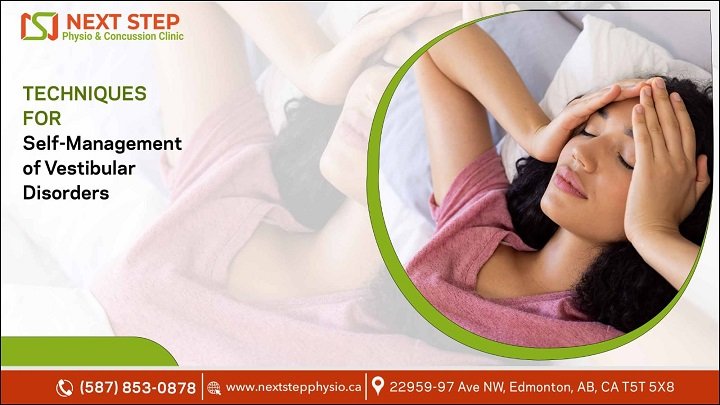Vestibular disorders impact the inner ear’s balance system. While professional treatment from a physiotherapist is crucial, incorporating self-management techniques into daily routines can further support recovery and enhance quality of life. Vestibular physiotherapy Edmonton offers self-management strategies for vestibular disorders, helping individuals regain balance and stability.
About Vestibular Disorder
The vestibular system within the inner ear is vital in maintaining balance and spatial orientation. Disruptions in this system due to Benign Paroxysmal Positional Vertigo (BPPV), labyrinthitis, vestibular neuritis, or Meniere’s disease affect balance and coordination. Common symptoms include dizziness, vertigo (a sensation of spinning), imbalance, nausea, and visual disturbances.
Vestibular disorders arise from various causes, including infections, injuries, and age-related degeneration.
Self-Management Techniques for Vestibular Disorders
Managing vestibular disorders involves incorporating techniques into one’s daily routine, often with the support of vestibular physiotherapy in Edmonton. These strategies can enhance overall well-being through vestibular rehabilitation.
Vestibular Exercises for Home Practice
Vestibular exercises help to retrain the brain to compensate for abnormal signals from the inner ear. These exercises can help alleviate dizziness and enhance balance over time. Critical exercises that can be performed at home as part of vestibular rehabilitation therapy include:
Gaze Stabilization Exercises
Gaze stabilization exercises improve the focus on a stationary object while moving the head. To perform this exercise, an individual should sit or stand comfortably and focus on a fixed point, such as an object on the wall. They should then move their head slowly from side to side while focusing on the target. First, try to start slowly, then gradually increase the speed as comfort grows. Perform for 1-2 minutes several times daily to enhance gaze stability and reduce dizziness.
Brandt-Daroff Exercises
Brandt-Daroff exercises manage Benign Paroxysmal Positional Vertigo (BPPV) by helping to reposition displaced crystals in the inner ear. To perform these exercises, an individual should begin by sitting on the edge of their bed. They should then quickly lie down on one side with the head tilted upward and remain in this position for about 30 seconds or until dizziness subsides. After returning to the sitting position, they should repeat the process on the opposite side. Perform this sequence 5-10 times daily, as a physiotherapist directs.
Balance Training
Balance training improves stability and coordination. An essential exercise involves standing with feet together and eyes closed. The individual should stand with feet close together, arms by their sides, and close their eyes, trying to maintain balance for 30 seconds. The exercise improves by standing on one foot or using a balance board. Increasing the duration of the training or incorporating dynamic movements, such as gentle head turns, enhances stability and reduces the risk of falls.
Habituation Exercises
Habituation exercises build a tolerance to movements or positions that trigger dizziness. Identify specific triggers, such as quick head turns or bending over, and perform these movements in a controlled manner. Start with a few repetitions and gradually increase as tolerance improves. Perform these exercises 2-3 times daily, or as advised by a healthcare provider, to desensitize the vestibular system and reduce the intensity and frequency of dizziness.
Lifestyle Modifications
Specific lifestyle changes impact self-management through vestibular physiotherapy. These adjustments can help reduce the frequency of symptoms and enhance overall quality of life.
- Dietary Changes: Dietary modifications can benefit those with Meniere’s disease or vestibular migraines. Reducing salt intake and caffeine helps minimize fluid retention in the inner ear and reduce vertigo episodes.
- Hydration: Staying hydrated is essential to reduce dizziness. Dehydration can exacerbate symptoms, so drinking plenty of water throughout the day is necessary.
- Sleep Hygiene: Ensuring adequate sleep is essential for managing vestibular disorders. Poor sleep can worsen symptoms of dizziness and fatigue. Establish a regular sleep schedule to ensure a comfortable sleep environment.
Environmental Modifications
- Addressing potential hazards to ensure safety can reduce the risk of injuries at home. One critical step is to remove tripping hazards like loose rugs and clutter from walkways. This simple adjustment can prevent accidents and make navigation safer. Proper lighting throughout the home is also crucial, as it improves visibility and helps individuals avoid obstacles that might cause falls.
- Adapting the environment to accommodate vestibular symptoms can significantly affect the workplace. Ergonomic adjustments, like an adjustable chair, help create a more comfortable and supportive workspace. Regular breaks are essential to rest and avoid overexertion, which can exacerbate symptoms.
Mind-Body Techniques
Mind-body practices offer valuable benefits for managing both the psychological and physical aspects of vestibular disorders. Yoga is an effective mind-body technique that enhances balance, flexibility, and relaxation. Specific poses, such as Tree Pose or Warrior Pose, promote stability and can be integrated into a regular practice routine. Combining yoga with deep breathing and meditation further helps to reduce stress and manage the symptoms of vestibular disorders.
Taking Control of Vestibular Health
Managing a vestibular disorder requires a comprehensive approach that combines professional treatment with self-management techniques, supported by vestibular physiotherapy in Edmonton. Every individual’s experience with vestibular disorders is unique, so working closely with Next Step Physiotherapy to tailor a self-management plan to specific needs is essential.
Next Step Physio Clinic is committed to supporting individuals on their journey to recovery. For those struggling with a vestibular disorder, the clinic offers personalized care and guidance to help restore balance and improve quality of life.
Read More: Rehabilitation in Massachusetts

